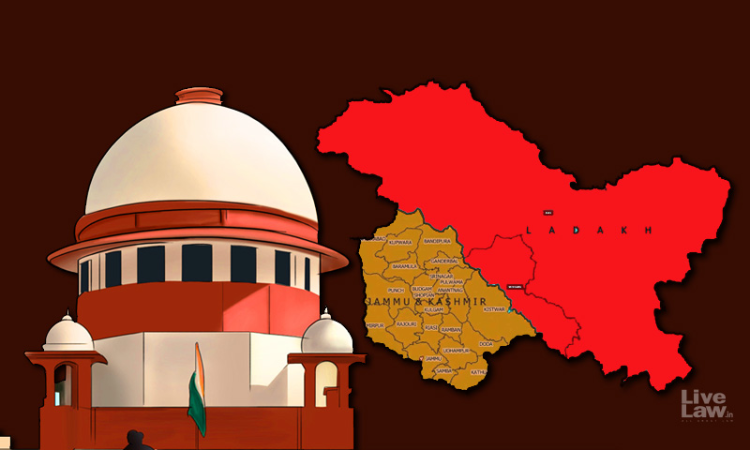- Home
- /
- Top Stories
- /
- Supreme Court Allows Convict To...
Supreme Court Allows Convict To Challenge J&K Policy Disallowing Remission In Terrorism-Related Offences
Gursimran Kaur Bakshi
15 July 2025 2:39 PM IST
The Supreme Court today(July 15) allowed the petitioner, a life convict, to challenge a rule in the Jammu & Kashmir Prison Manual, 2022, which disallows premature release to those convicted in relation to a terrorism offence. The allegations against the petitioner are that he illegally obtained weapons and killed certain surrendered militants who were working as a local source to the...
The Supreme Court today(July 15) allowed the petitioner, a life convict, to challenge a rule in the Jammu & Kashmir Prison Manual, 2022, which disallows premature release to those convicted in relation to a terrorism offence. The allegations against the petitioner are that he illegally obtained weapons and killed certain surrendered militants who were working as a local source to the Indian Army.
A bench comprising Justice Ahsanuddin Amanullah and Justice S.V.N. Bhatti, allowed the petitioner to file an interlocutory application, since the main petition was only limited to premature release and not a challenge to the policy.
Senior Advocate Colin Gonsalves, for the petitioner, had submitted that there was no allegation of terrorism against him. Nor were the Terrorist and Disruptive Activities (Prevention) Act charges applicable to him as per the trial court's order.
Against this, Additional Solicitor General K.M. Nataraj submitted that his case was considered and he was denied remission on grounds that although TADA was not applied to him, he was arrested in connection with a case where the element of terrorism was involved in the backdrop.
As per the allegations, when the dead bodies of the people he murdered were inspected, 5 bullets, 11 empty cartridges of an AK 47 rifle and one UGBL grenade thrower were recovered on the spot.
On this, Justice Ahsanuddin said: "Mr. Gonsalves, two things. If he was not charged under TADA, it does not matter. The policy for remission is separate. The policy that your act was not connected in any way which is related to an act amounting to terrorism. Here, you enter into a person's house and force him to give...and then you kill him because he was an informer. He said, you got the wrong person, I am innocent, this is what is written!...It is a terrorist act that you want to create fear that nobody can report about illegal activity to the authorities on side of the law..."
Justice Ahsanuddin stated that it does not matter that he is being denied remission despite no terrorist-related offences applying to him because he had "terrorist connections" and the court cannot shut its eyes to it.
However, Gonsalves continued to argue that the trial court's order nowhere mentions that he had terrorist connections. Nor is it there in the high court's order.
Against this, Justice Ahsanuddin said: "If terrorists are entitled to [remission] after 20 years, that may be an argument but without challenging this policy we don't find anything in this."
ASG Nataraj submitted that the policy disallowing remission to convicts related to terrorism is not under challenge in this case. Therefore, the Court suggested that the petitioner may first challenge the policy.
The order passed: "Learned ASG has filed an affidavit to put on record an order passed by competent authority rejecting premature release to the petitioner...under the policy of the State Government, any person convicted for life imprisonment in connection to terrorist crime cannot be released. The learned senior counsel after some arguments in view of the aforesaid position is that he may be permitted to file an amended interlocutory application challenging the policy as it is against the constitutional provisions. Further, the policy is under challenge in another pending case. In view of the facts, the application seeking amendment is allowed and kept after two weeks."
On the order, ASG Nataraj expressed reservations that in a case where the policy is under challenge, the court had already said that it can't be challenged in the Supreme Court and that the petitioner will have to go to the high court.
The writ petition has been filed under Article 32 seeking premature release of the petitioner, having undergone 24 years and 11 months as on October 31, 2023. The petitioner was convicted of murder under the Ranbir Penal Code and Section 7/27 of the Indian Arms Act by a Sessions Judge, Budgam in 2010. He was sentenced to rigorous life imprisonment.
It is the case that the petitioner is squarely covered under Rule 20.09 of the Jammu & Kashmir Prison Manual, 2022 and also under the Model Prison Manual, 2026, which allows remission for life convictions after having completed 14 years of actual imprisonment.
Case Title: GHULAM MOHAMMAD BHAT Vs UNION TERRITORY OF JAMMU AND KASHMIR|W.P.(Crl.) No. 66/2024
Click Here To Read/Download Order



